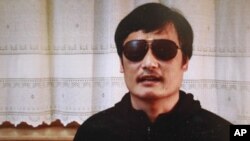Blind Chinese activist Chen Guangcheng says all of the paperwork for his trip to the U.S. is ready from the American side, but that there has been no progress made on his passport from Chinese authorities.
In an interview with VOA from a hospital in Beijing Thursday, Chen said he spoke with Professor Jerome Cohen, who invited him to study law at New York University. Chen said Cohen told him that the university is ready for his arrival and that "both the principal and president of the university extended a welcome" to him.
Chen said that, as of now, there is no trace of his or his family's passports. He said that on Monday, a mid-level official from the State Bureau for Letters and Calls discussed applications for passports with him, but did not give any feedback.
Chen said he submitted the application "orally," and informed the official that according to the Chinese law, blind people do not need to submit an application, or even file a lawsuit, in writing. He said the government official assured him that "it will get done," but that he did not say when.
Chen was given a four-year prison sentence in 2006 for exposing abuses under China's forced abortion policy aimed at population control. He had been under house arrest since 2010, before fleeing on April 22 to the U.S. embassy in Beijing, where he remained for six days.
The self-taught legal activist agreed to depart the embassy under a deal reached by U.S. and Chinese authorities that would have allowed him to stay in a safe place in China and study law. But he changed his mind hours after leaving the embassy, saying his family had been threatened, and he wanted to go to the United States.
Chen's stay at the U.S. embassy prompted complaints of '"interference" by Chinese officials. China said the United States should "take necessary measures" to prevent a repeat of events like the case of Chen Guangcheng.
The activist, who has been blind since childhood, is at a Beijing hospital recovering from injuries sustained in his escape almost three weeks ago.




